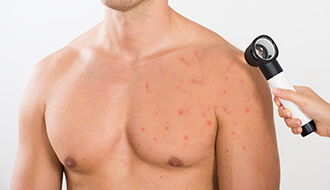
Medical Weight Loss Explained
A lot is said about medical weight loss but we are here to debunk the myths for you.
Dermatology > Lesions

Find Out More


Lesions are abnormal changes in tissue that can occur in any part of the body.
They vary in appearance, size, and cause, and can be benign (non-cancerous) or non-benign (cancerous).
Identifying and understanding lesions is crucial for effective treatment and management.
If you have a lesion or any concerns about your skin, please reach out to us.

A high percentage of skin lesions are benign, and these include:
Non-benign skin lesions are those that may potentially be cancerous or pre-cancerous. Some common types include:


Skin lesions can have various causes. Infections include bacterial (e.g., impetigo), viral (e.g., herpes simplex, warts), fungal (e.g., ringworm), and parasitic (e.g., scabies).
Inflammatory conditions like eczema (itchy patches), psoriasis (scaly patches), and dermatitis (from allergens) also contribute. Autoimmune diseases such as lupus (butterfly-shaped rash) and vitiligo (loss of pigment) are common causes.
Skin cancer can be basal cell carcinoma (pearly nodules), squamous cell carcinoma (scaly patches), or melanoma (irregular moles). Allergic reactions might cause hives or rashes, while trauma (cuts, bruises) and genetic disorders (neurofibromatosis, ichthyosis) can alter skin appearance. Environmental factors like sunburn can also lead to lesions.
For any skin lesion, our experts can examine and guide you to the right treatment. To help prevent lesions, you can:
Use our online booking engine or book your test by giving us a call.
On the online booking engine select the “appointment type” you need.
You will be seen by one of our friendly doctors or trained clinicians.

Gather any relevant medical history, including previous skin conditions, treatments, or any family history of skin cancer. Note any changes in skin lesions, such as size, shape, colour, or texture, and any symptoms like itching, bleeding, or pain. List any current medications, including over-the-counter drugs, supplements, and skincare products. Wear comfortable, easily removable clothing to facilitate the examination of all areas of your skin. Refrain from using tanning beds or excessive sun exposure prior to the exam, as this can affect the appearance of skin lesions.

The dermatologist will examine your skin lesions, which may involve undressing and changing into a gown. You might be asked to describe any changes or symptoms related to the lesions. Depending on the findings, your dermatologist may perform additional tests, such as a skin biopsy. Do not hesitate to ask any questions about the examination process.

Wait for the results of any tests or biopsies, which may take a few days to a few weeks. Once we receive the results, we will contact you and explain the next steps. Follow any instructions for caring for biopsy sites or other treatments. Continue to use any prescribed medications or skincare products as directed. Use sunscreen and protective clothing to prevent further skin damage.
Incorporated
in 1998
Experienced doctors & a professional team
Registration
not needed
Up-to-date with the latest treatments & testing
Strictly
confidential
Experienced doctors & a professional team
Affordable private
health care
Transparent fee structure with no hidden charges
We work with experienced consultants & healthcare professionals who have received positive feedback from our patients, and with whom we have established long-term relationships.
Latest Episode
Tune in to our podcast to explore the world of healthcare and learn from distinguished special guests. We cover everything from preventative measures to cutting-edge treatments so that you can stay informed and up-to-date on health-related things.

A lot is said about medical weight loss but we are here to debunk the myths for you.

Tourist in London and need a GP? Get fast, private care for illnesses, injuries, or lost medication. No registration needed.

With NHS appointments harder to access, many people are turning to private GPs for faster, more convenient care.
Subscribe for latest updates & news


From same-day private GP and blood test appointments to visa medicals, a sexual and reproductive health clinic, and preventative health screenings, we are here to help.
Contact Us
Accepted Insurance Companies






Please note that Walk-in Clinic is a private medical centre & not an NHS service. Harley Walk-in Clinic Ltd company registration no. 07472804